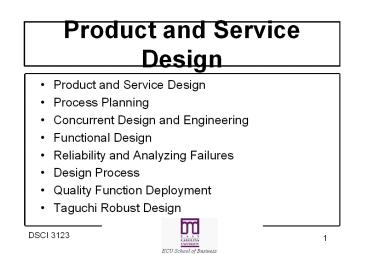Product and Service Design - PowerPoint PPT Presentation
Title:
Product and Service Design
Description:
Title: Math 326 Mathematics for Decision Making Author: Teacher Last modified by: Dr. John Kros Created Date: 8/18/1997 2:58:50 PM Document presentation format – PowerPoint PPT presentation
Number of Views:63
Avg rating:3.0/5.0
Title: Product and Service Design
1
Product and Service Design
- Product and Service Design
- Process Planning
- Concurrent Design and Engineering
- Functional Design
- Reliability and Analyzing Failures
- Design Process
- Quality Function Deployment
- Taguchi Robust Design
2
Product Design
- Specifies materials
- Determines dimensions tolerances
- Defines appearance
- Sets performance standards
3
Service Design
- Specifies what the customer is to experience
- Determines setting and degree of customer
involvement - Defines physical items, physiological benefits,
psychological benefits the customer receives - Sets standards for delivery
4
An Effective Design Process
- Matches product/service characteristics with
customer needs - Meets customer requirements in the simplest, most
cost-effective manner - Reduces time to market
- Minimizes revisions
5
Feasibility Study
- Market Analysis
- Economic Analysis
- Technical / Strategic Analysis
6
Perceptual Map Of Breakfast Cereals
7
Process Planning
- Create workable instructions for manufacture
- Select tooling equipment
- Prepare job descriptions
- Determine operation assembly order
- Network all systems
8
Improving The Design Process
- 1. Implementing concurrent engineering/design and
design teams - 2. Analyzing functional design, reliability, and
maintainability - 3. Measuring design quality
- 4. Utilizing quality function deployment
- 5. Designing for robustness
9
Concurrent Design
- Also known as simultaneous or concurrent
engineering - Simultaneous decision making by design teams
- Integrates product design process planning
- Details of design more decentralized
- Encourages price-minus, not cost-plus pricing
- Needs careful scheduling because tasks are done
in parallel
10
Concurrent Design
Customers
Design
Engineering
Marketing
Suppliers
Production
11
Design Teams
- Cross-functional
- Marketing, manufacturing, engineering, finance
- Vertical
- Suppliers, dealers, customers
- Horizontal
- Lawyers, accountants, insurance companies
12
(No Transcript)
13
Functional Design(How The Product Performs)
- Reliability
- probability product performs intended function
for specified length of time - Maintainability
- ease and/or cost or maintaining/repairing product
14
Analyzing Failures
- Failure Mode and Effects Analysis (FMEA)
- a systematic approach for analyzing causes and
effects of failures - prioritizes failures
- attempts to eliminate causes
- Fault Tree Analysis (FTA)
- more visual
- studies interrelationship between failures
15
Failure Mode Effects Analysis
16
Fault Tree Analysis
Solved
Solved
17
Computing Reliability
18
Quality Function Deployment (QFD)
- Translates the voice of the customer into
technical design requirements - Displays requirements in matrix diagrams
- First matrix called house of quality
- Series of connected houses
19
House Of Quality
5. Tradeoff Matrix
3. Product characteristics
Importance
1. Customer requirements
4. Relationship matrix
2. Competitive assessment
6. Technical assessment and target values
20
House Of Quality for a Steam Iron
21
Series of Connected Houses
Customer Req.
Product Characteristics
A-1
Part Characteristics
Process Characteristics
House of Quality
A-2
A-3
Operations
Parts Deployment
A-4
Process Planning
Operating Requirements
22
Benefits Of QFD
- Promotes better understanding of customer demands
and design interactions - Increases customer satisfaction
- Breaks down barriers between functions
departments fosters teamwork - Improves design/development process documentation
- Reduces the of engineering changes, cost of
design manufacture, and brings new designs to
the market faster
23
Taguchis Robust Design
- A product or service exhibits robustness if it
performs consistently regardless of the operating
conditions - Designers must consider both controllable factors
(design features) and uncontrollable factors
(operating conditions) in design for robustness
24
Consistency Is Important
- Consistent errors are easier to correct than
random errors - Parts within tolerances may yield assemblies
which arent within tolerances - Consumers prefer product characteristics near
their ideal values
25
Taguchis Quality Loss Function
Quality Loss
Target
Lower Tolerance Limit
Upper Tolerance Limit































